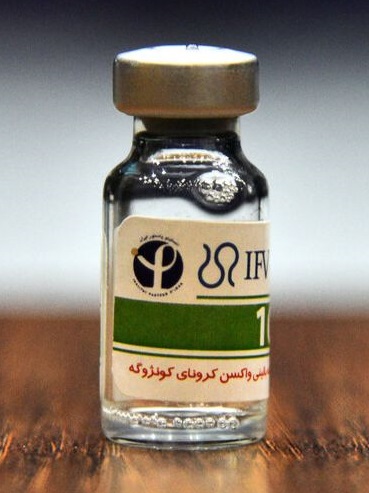Unlike big pharma’s high-maintenance COVID shots, Cuba’s vaccine offerings are cheap, stored at room temperature, easily scalable, and have been offered to the world.
As the United States and Europe look to be capitulating to the coronavirus, some nations are ramping up their efforts to deal with the pandemic. Among these is Cuba, the tiny Communist nation that’s been under U.S. sanctions for sixty years, but has still managed to develop their own homegrown COVID vaccines, inoculate over 90% of their citizens without a mandate, and start the process of distributing their Abdala and Soberana 02 vaccines to countries that have barely a wisp of a chance of competing for the Moderna and Pfizer doses that the richer nations are hoarding. If it works, Cuba’s vaccine diplomacy (and, it appears, the 90% effectiveness rate against symptomatic COVID after three doses) may do something that the world’s premier nations haven’t been able to: start winding down the pandemic.
Under a comprehensive embargo that the United States has enforced since John F. Kennedy decided to punish the island nation in 1962, Cuba has had a devil of a time trying to import everything from medicine to food to spare parts for their aging auto fleet. Necessity being the gender-nondiscriminatory co-parent of invention, though, Cuba is making good on Fidel Castro’s investment in healthcare and medical education by rolling out not one, but five different COVID vaccines, the first small country, and first Latin American or Caribbean nation to develop their own.
Unlike the fancy, high-maintenance mRNA vaccines produced by Moderna and Pfizer, Cuba’s vaccine efforts used older technology that has long been proven safe for all age groups. They’re all subunit protein vaccines, made by fermentation in mammalian cells, like the Novavax vaccine. Critically, they are cheap to produce, easy to scale up, and are stable at room temperature, all of which make them likelier candidates for uptake in low-income countries.

Much as Cuba’s doctors serve as their humanitarian contribution to impoverished countries (and even underserved populations in the U.S.), so too will Cuba’s vaccine outreach. It’s easy to understand why Cuba would preferentially choose to assist and partner with other nations that the United States prefers not to touch. When Cuba sought international collaboration for human clinical trials, and later the ability to ramp up industrial-level production of their Soberana 02 vaccine, Iran stepped up to help. Venezuela and Vietnam were the first countries to receive exports of the Abdala vaccine, which was named after a poem by José Marti, a Cuban national hero. Earlier this month, they donated about 240,000 doses to Syria. No wonder the Global South is looking to Cuba’s vaccine mission as the way forward, rather than waiting for big, capitalist countries to save the day.
Besides the wait to have their vaccines officially approved by the World Health Organization, there’s another problem: the embargo. Progressive International recently sought contributions in order to send a team to Havana to meet up with scientists, government officials and public health leaders in order to promote Cuba’s vaccine technology. Unfortunately, both ING (a Dutch multinational bank) and PayPal have blocked those contributions, citing the U.S. embargo. Apparently vaccinating the world (saving lives, breaking the pandemic, and reducing the likelihood of future variants) is less important than bowing to U.S. hegemony.
“We are not a multinational where returns are the number one reason for existing,” Vicente Vérez Bencomo of the Finlay Vaccines Institute in Cuba told Progressive International, about why Cuba offered their vaccine technology to the world. “For us, it’s about achieving health.”
The embargo has not entirely succeeded in breaking Cuba, although it has certainly wrought a lot of suffering for everyday Cubans. Cuba’s pariah status (from the U.S. point of view) has, however, given it common cause with the rest of the world that is not well served by the U.S., multinational corporations, or capitalism in general. The United States has a choice. It can ease up on the embargo, support the effort to vaccinate the world, and maybe someday share in the public health rewards of doing so. Or, it can become less relevant than ever to large swaths of the world, as other countries find ways to work around U.S. dominance, teaming up and building alliances with each other in a process not unlike building dual power. The U.S. is still a force to reckon with. However, if it wants the power inherent in being the global hegemon but not the associated responsibility of caring for the world’s people, eventually it’ll be the global old man yelling at cloud.
Related: Cuba Could Teach Us a Few Things
Sources:
As nations decide to live with the virus, some disease experts warn of surrendering too soon
Europe considers new COVID-19 strategy: Accepting the virus
Cuba’s vaccine success story sails past mark set by rich world’s Covid efforts
Why Cuba’s extraordinary Covid vaccine success could provide the best hope for low-income countries
Cuba has vaccinated most against Covid-19, more than most large, rich countries
Why Cuba developed its own covid vaccine—and what happened next
Cuba says Iran to start producing one of its COVID-19 vaccines
Vietnam Signs Cuban COVID-19 Vaccine Supply Deal
Cuba Begins Exporting Vaccines to Venezuela and Vietnam
Cuba donates home-grown COVID-19 vaccines to Syria
We are going to Cuba to help vaccinate the world
Bank Blocks Donations Supporting Cuban Effort to Vaccinate World


Join the conversation!